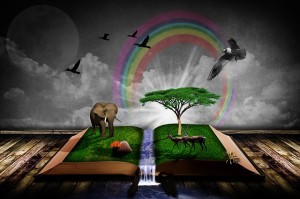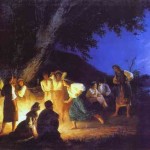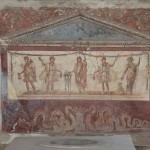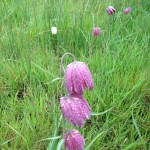
This is my list of recommended reading for beginners. Many other lists are available. If you don’t like my list, make your own. I have tried to keep the list fairly short, so as not to overwhelm you with a great long shopping list.
My recommendation would be to read widely and deeply, noting what you agree with, what riles you, and what attracts you. You don’t have to agree with everything you read. Rather you should engage with it, see how it affects you, think about any issues it raises for you.
I have always had trouble with books that have exercises in them, because I tend to think, “Oh yes I will do that exercise later” and I either skip over it and never come back to it, or put the book down and never finish it.
I have to confess that whilst I have read a few books on Heathenry and Druidry, none of them strike me as general introductions or 101 books, so I will refer you to other people’s lists for beginners in those traditions, and other polytheist traditions.
Pagan books
The Art of Conversation with the Genius Loci, by Barry Patterson
I have often said to people that if they only ever read one book on Paganism, it should be this one. It is all about how to engage with the landscape you live in, and how to connect with the spirits of place. It offers practical suggestions for deepening your connection with nature.
Drawing Down the Moon: Witches, Druids, Goddess-Worshippers, and Other Pagans in America by Margot Adler
A great, and classic, introduction to contemporary Paganism. Goes into the beliefs, practices and communities in some depth. Evocatively and accessibly written.
The Way of Wyrd by Brian Bates
This is one of my favourite books of all time. It is an exploration of the world of Anglo-Saxon Heathenry from the point of view of a young Christian missionary who comes to respect the Anglo-Saxon sorcerer he has been sent to learn from. It was based on the author’s PhD research into the Leechbook, an Anglo-Saxon herbal.
Books on Wicca
The Triumph of the Moon: A History of Modern Pagan Witchcraft by Ronald Hutton
A must-read for anyone who wants to know the history of Wicca, with some reflections on how and why why the Pagan revival happened. Ronald Hutton examines the historical conditions and cultural movements that gave rise to the Pagan revival and the birth of Wicca, and looks at more recent history as well.
Her Hidden Children: The Rise of Wicca and Paganism in America by Chas S. Clifton
The story of the Pagan revival in the United States. Very well-written and researched. The US equivalent of Triumph of the Moon.
Wicca: Magickal Beginnings by Sorita d’Este and David Rankine
A textual and historical analysis of the possible origins of the rituals and practices of this modern tradition of Pagan Witchcraft. A fascinating book that I found to be really interesting and to deepen my understanding of Wicca.
Wicca: the Old Religion in the New Millennium by Vivianne Crowley
An excellent introduction to Wicca, with an exploration of the dynamics of the rituals from a Jungian perspective. First published in 1989, with a revised edition in 1997, this book is still a classic. In a recent reflection on the book, Vivianne Crowley wrote:
When I wrote Wicca, I had been in Wicca for 15 years. What I had seen in that time was how Wicca had the potential to transform people. Many of the processes that I had seen occurring as people worked their way through the initiatory systems were those that manifest through the inner journey of growth that Carl Gustav Jung called ‘individuation’. By exposing our inner world to the Gods and to those who share the spiritual journey with us, we are transformed. This is not the matter of a few years, but a lifelong process, which initiatory Wicca at its best can nurture, support and foster. The purpose of such a journey is that of the Great Work – the transformation of self as a starting point for the transformation of humankind; for if individuals do not change, then societies cannot evolve. Our aim is to grow nearer the Gods, to move from our egocentric engagement with the world for our own ends, to a re-centering that detaches us from our own preoccupations and allows us the see the world from a wider, deeper, and longer-term perspective.
On my to-read list
A couple of books I haven’t read yet, but keep meaning to get around to, as I see them recommended often on other people’s lists:
- The Deities Are Many: A Polytheistic Theology by Jordan D. Paper
- A World Full of Gods: An Inquiry Into Polytheism by John Michael Greer
Other reading lists
- Pagan 101 resources – a comprehensive list on Tumblr
- John Beckett’s reading list for Druidry
- Three books for Polytheists – John Beckett
- My list of books and resources for LGBTQIA Pagans
- Best Wicca 101 books on Goodreads
- Gaulish Polytheism reading list
- Kemeticism 101
- Gallina Krasskova’s list of Polytheism resources for beginners
- 5 best intro books on Greco-Roman polytheism – Ursus
- Books on Wicca by Amber K on Goodreads
- Popular Heathen books on Goodreads
- Popular Polytheism books on Goodreads
This post is part of a series, Paganism for Beginners. All the posts in this series will appear in the category ‘A Beginner’s Guide‘.
















